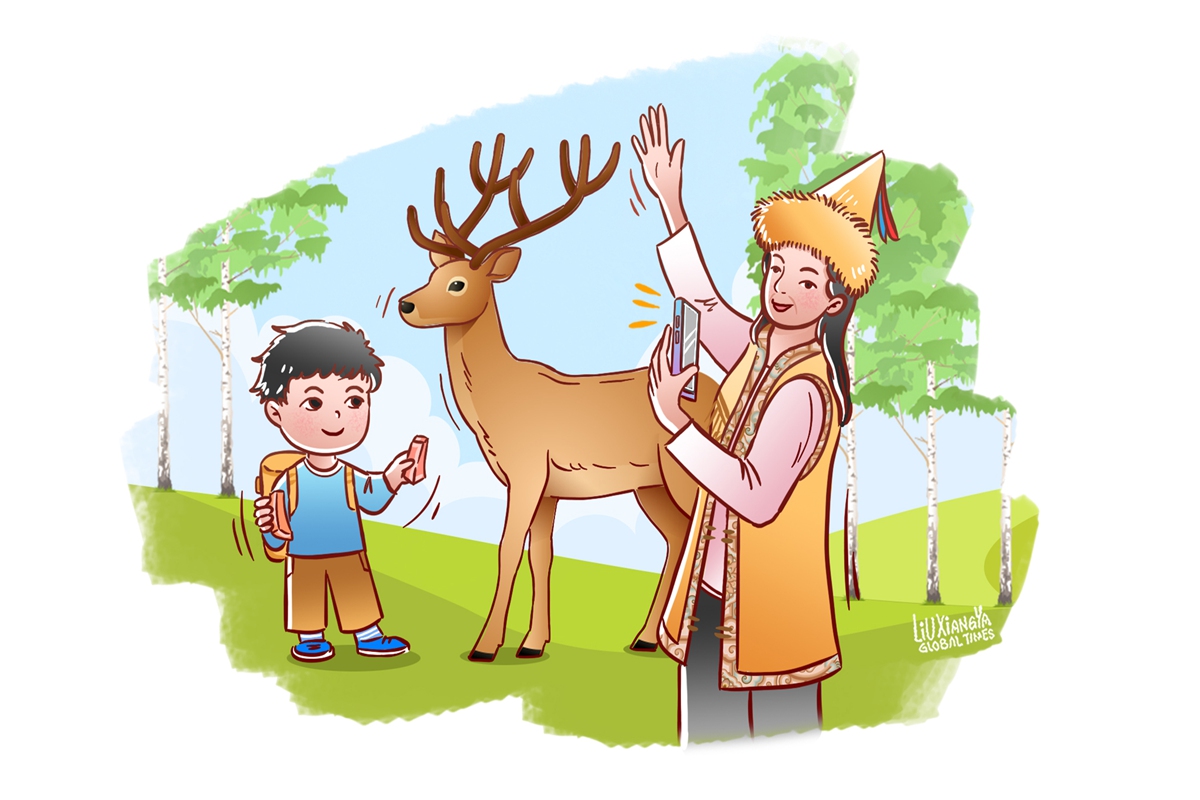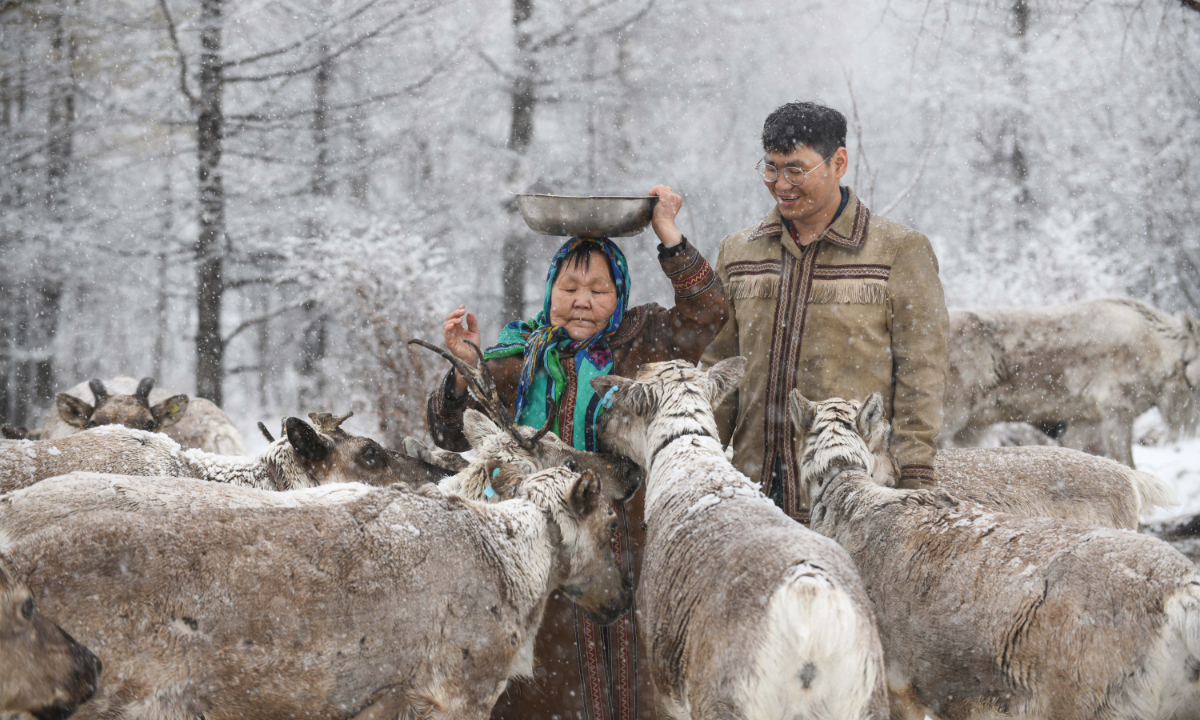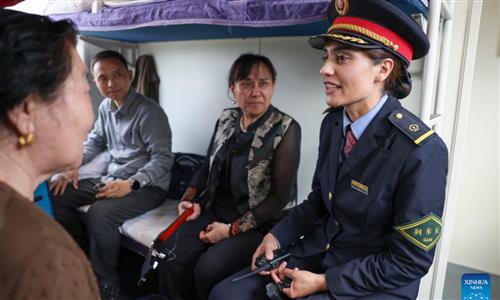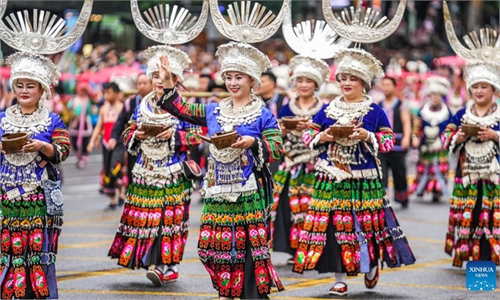ARTS / CULTURE & LEISURE
Revitalizing the ancient Evenki culture
At the beginning of 2024, a short video of a person dressed in ethnic attire walking a reindeer down the street went viral on various social media platforms both domestically and internationally. It not only boosted tourism in Harbin, Northeast China's Heilongjiang Province, but also drew attention to the origin of reindeer in China.

The Reindeer Evenki transitioned directly from a primitive society to a socialist society, earning the historical title of the "Reindeer Tribe" and the distinction of being China's last hunting tribe. They are the only group in China that raises reindeer and preserves reindeer culture. In 2003, they moved from the forests to settle in the city of Genhe, yet their traditional reindeer herding culture remains largely intact.
Bringing this ancient tribe into the public eye, the novel The Right Bank of the Argun by Mao Dun Literature Prize winner Chi Zijian tells the survival story of the Reindeer Evenki through the voice of the tribe's last female chieftain. As the novel gained popularity, Genhe also became a popular destination for experts, scholars, and cultural tourism bloggers.
I first visited Genhe in 2011 as a photographer. The unique cultural atmosphere of the Reindeer Evenki deeply touched me. Over the following decade, I captured portraits of 34 of the most representative members of the Reindeer Evenki, as well as members of the younger generation, documenting the past and present of China's only existing reindeer tribe. During this time, I witnessed the process of the Reindeer Evenki preserving and passing on their ancient culture in the modern era.
Due to social development, the lives of the Reindeer Tribe have quietly changed, moving from pure reindeer herding and hunting to gradually integrating into modern society.
"We now have tents, RVs, wireless transmitters, solar panels, and mobile phone service, making life much more convenient than before," said Xiao Liangku, an Evenki tribe member.
Today, the younger generation of Reindeer Evenki have great ambition and ideas. Improved living conditions have strengthened their resolve to preserve their reindeer culture. The power of technology allows them to both "stay" and "venture further."
In July, I met a young couple from South China's Guangdong Province. They had discovered this tribe through short video platforms and decided to visit. They enjoyed chopping wood and feeding reindeer immensely.
"It's fascinating and full of natural charm, something you don't see in the city," they told me.

Bu Dongxia is a member of the Reindeer Evenki community. His son, Xiao Chenhao, leverages Genhe's natural resources and reindeer culture to promote cultural tourism. Live streaming and new media have become powerful channels for him to reach the outside world. By sharing videos of his parents' daily lives online, he has garnered significant attention from both domestic and international netizens.
Influenced by his son, Bu Dongxia confidently faces the camera to teach social media followers how to speak Evenki. "The Evenki people have no written language and rely on oral tradition. Seeing young people innovatively preserve and pass on Evenki handicrafts and reindeer herding knowledge is very comforting," Bu said.
Xiao Chenhao now organizes educational tours, allowing children to interact closely with reindeer, make traditional bread, and learn about Evenki history and culture.
He is committed to preserving and passing on Evenki culture in his own way and says that increasing opportunities in his hometown will encourage more young people to return.
In recent years, thanks to local policy support, many young people in Aoluguya Ewenki Ethnic Township have started businesses such as reindeer product stores and family homestays at the foot of the mountains, achieving good annual income. Statistics show that the per capita net income of Evenki hunters rose from 2,892 yuan ($400) in 2003 to about 32,000 yuan in 2022.
In recent years, Genhe has focused on developing high-quality cultural tourism, emphasizing the integration and exploration of its cultural and natural resources. They have worked on distinctive and expansive projects, highlighting the creation of China's "Cold Pole." Moreover, the Reindeer Tribe Scenic Area has been upgraded. Events such as the third Reindeer King Contest, the 10th Cold Pole Ice and Snow Season and the China Cold Pole Marathon, along with a cultural interview program, have significantly boosted the popularity of Genhe, attracting new fans.
Today, the reindeer herding customs of the Aoluguya Evenki hunters are listed as a national intangible cultural heritage. The Aoluguya Ewenki Ethnic Township, known as the home of the "last reindeer tribe in China," is gaining increasing recognition through various cultural tourism projects. Transitioning from primitive hunting to tourism and from isolation to cultural exchange, the Reindeer Evenki are preserving and innovating their culture.
The author is a photographer dedicated to ethnic culture. life@globaltimes.com.cn

Illustration: Liu Xiangya/GT
The Evenki people, one of China's 56 ethnic groups, have a branch known as the Reindeer Evenki, named for their tradition of reindeer herding. In the mid-17th century, the Reindeer Evenki migrated from the Lake Baikal region to the Ergun River area and gradually settled in the dense forests of the Greater Khingan Mountains in Inner Mongolia Autonomous Region.The Reindeer Evenki transitioned directly from a primitive society to a socialist society, earning the historical title of the "Reindeer Tribe" and the distinction of being China's last hunting tribe. They are the only group in China that raises reindeer and preserves reindeer culture. In 2003, they moved from the forests to settle in the city of Genhe, yet their traditional reindeer herding culture remains largely intact.
Bringing this ancient tribe into the public eye, the novel The Right Bank of the Argun by Mao Dun Literature Prize winner Chi Zijian tells the survival story of the Reindeer Evenki through the voice of the tribe's last female chieftain. As the novel gained popularity, Genhe also became a popular destination for experts, scholars, and cultural tourism bloggers.
I first visited Genhe in 2011 as a photographer. The unique cultural atmosphere of the Reindeer Evenki deeply touched me. Over the following decade, I captured portraits of 34 of the most representative members of the Reindeer Evenki, as well as members of the younger generation, documenting the past and present of China's only existing reindeer tribe. During this time, I witnessed the process of the Reindeer Evenki preserving and passing on their ancient culture in the modern era.
Due to social development, the lives of the Reindeer Tribe have quietly changed, moving from pure reindeer herding and hunting to gradually integrating into modern society.
"We now have tents, RVs, wireless transmitters, solar panels, and mobile phone service, making life much more convenient than before," said Xiao Liangku, an Evenki tribe member.
Today, the younger generation of Reindeer Evenki have great ambition and ideas. Improved living conditions have strengthened their resolve to preserve their reindeer culture. The power of technology allows them to both "stay" and "venture further."
In July, I met a young couple from South China's Guangdong Province. They had discovered this tribe through short video platforms and decided to visit. They enjoyed chopping wood and feeding reindeer immensely.
"It's fascinating and full of natural charm, something you don't see in the city," they told me.

Photo: Courtesy of Wang Wei
Bu Dongxia is a member of the Reindeer Evenki community. His son, Xiao Chenhao, leverages Genhe's natural resources and reindeer culture to promote cultural tourism. Live streaming and new media have become powerful channels for him to reach the outside world. By sharing videos of his parents' daily lives online, he has garnered significant attention from both domestic and international netizens.
Influenced by his son, Bu Dongxia confidently faces the camera to teach social media followers how to speak Evenki. "The Evenki people have no written language and rely on oral tradition. Seeing young people innovatively preserve and pass on Evenki handicrafts and reindeer herding knowledge is very comforting," Bu said.
Xiao Chenhao now organizes educational tours, allowing children to interact closely with reindeer, make traditional bread, and learn about Evenki history and culture.
He is committed to preserving and passing on Evenki culture in his own way and says that increasing opportunities in his hometown will encourage more young people to return.
In recent years, thanks to local policy support, many young people in Aoluguya Ewenki Ethnic Township have started businesses such as reindeer product stores and family homestays at the foot of the mountains, achieving good annual income. Statistics show that the per capita net income of Evenki hunters rose from 2,892 yuan ($400) in 2003 to about 32,000 yuan in 2022.
In recent years, Genhe has focused on developing high-quality cultural tourism, emphasizing the integration and exploration of its cultural and natural resources. They have worked on distinctive and expansive projects, highlighting the creation of China's "Cold Pole." Moreover, the Reindeer Tribe Scenic Area has been upgraded. Events such as the third Reindeer King Contest, the 10th Cold Pole Ice and Snow Season and the China Cold Pole Marathon, along with a cultural interview program, have significantly boosted the popularity of Genhe, attracting new fans.
Today, the reindeer herding customs of the Aoluguya Evenki hunters are listed as a national intangible cultural heritage. The Aoluguya Ewenki Ethnic Township, known as the home of the "last reindeer tribe in China," is gaining increasing recognition through various cultural tourism projects. Transitioning from primitive hunting to tourism and from isolation to cultural exchange, the Reindeer Evenki are preserving and innovating their culture.
The author is a photographer dedicated to ethnic culture. life@globaltimes.com.cn



